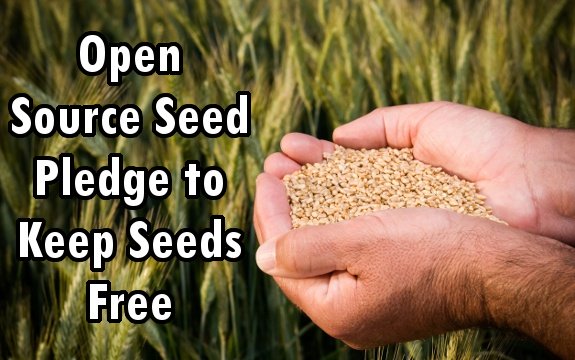Open Source Seed Pledge Aims to Keep Seeds in Public Hands, Not Corporations’

 The overwhelming majority of crops grown in the U.S. for commercial distribution are regulated and restricted by patents and other forms of intellectual property protection. These licenses and patents are great for large corporations, but bad for the average person. This trend, of patenting seeds and the plants they produce, is extending to vegetables and other crops more likely to be grown by small farmers and gardeners. But a new and novel movement is hoping to slow the spread.
The overwhelming majority of crops grown in the U.S. for commercial distribution are regulated and restricted by patents and other forms of intellectual property protection. These licenses and patents are great for large corporations, but bad for the average person. This trend, of patenting seeds and the plants they produce, is extending to vegetables and other crops more likely to be grown by small farmers and gardeners. But a new and novel movement is hoping to slow the spread.
On April 16, a group of famers, scientists, and sustainable food advocates gathered at the University of Wisconsin-Madison campus to welcome 29 new vegetable seed varieties to the public realm. What makes these seeds different is they are backed by a “novel form of ownership” called the Open Source Seed Pledge.
According to the University, the pledge is designed to keep new seeds available for all people to breed, grow, and share throughout the generations, without restrictions and patents.
“These vegetables are part of our common cultural heritage, and our goal is to make sure these seeds remain in the public domain for people to use in the future,” said horticulture professor Irwin Goldman.
Read: Brazil Activists Stand Up to Biotech’s GMOs
Goldman, also a plant breeder, helped develop the language of the Open Source Seed Pledge, printed on all seed packets under the program. The pledge reads:
“This Open Source Seed pledge is intended to ensure your freedom to use the seed contained herein in any way you choose, and to make sure those freedoms are enjoyed by all subsequent users. By opening this packet, you pledge that you will not restrict others’ use of these seeds and their derivatives by patents, licenses, or any other means. You pledge that if you transfer these seeds or their derivatives they will also be accompanied by this pledge.”
It’s part of the Open Source Seed Initiative (OSSI), whose overall goal is to keep seeds set-aside for use as the public sees fit, without interference from patents and corporate laws. Their charge, to “Free the Seed!”
“It’s almost like a haiku,” says Goldman. “It basically says these seeds are free to use in any way you want. They can’t be legally protected. Enjoy them.”
It means you, as a grower, can experiment in cross-pollination and breeding without fear of legal repercussions.
“You can sell these open source seeds just like you’d sell any other seeds. The difference is that the recipients can actually do stuff with them, which is kind of fun.”
